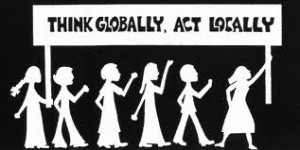Six reasons for a social justice award
September 4th, 2013 | Published in Education
There is probably no need to justify a social justice student award, but I can think of at least six good reasons for establishing one.
1. Social justice is important
 Likewise, there is probably no need to say that social justice is important, but it nonetheless seems worth saying. Establishing a social justice award is one way of doing so. Making a submission for such an award is another.
Likewise, there is probably no need to say that social justice is important, but it nonetheless seems worth saying. Establishing a social justice award is one way of doing so. Making a submission for such an award is another.
Whether or not social justice is an existing part of your worldview, consider, for example, access to education, health, mental health, and justice systems, employment opportunities, safe and affordable housing, and adequate living conditions. In each of these areas, among others, the reality is inequitable access, which flags social justice concerns, which in turn need work. If you take on this work, you will never be out of work, although you may be out of pocket. I don’t know any rich activists, but this award is a statement that social justice work is valuable, and valued.
2. It may be a label worth claiming
I only recently started thinking of myself as a social justice psychologist – and I’m now retired, so it’s all rather after the fact. My reluctance to claim the label (identity) was part of a general reluctance about labels, specifically diagnostic ones that problematise individuals and reduce the effects of social injustices to personal pathologies. Labels can be totalising, demeaning, and powerful, even outside the realm of mental health. I am reminded, for example, of episodes of Boston Legal in which Melvin Palmer, loud-mouthed Texan lawyer, repeatedly says to Alan Shore, as opposing counsel: “You’re a hoot. That’s what you are, Alan Shore. You’re a hoot.” It’s intentionally abrasive, offensive, and it sticks.
Labels do stick, so critique is important. One of the books I consider a classic is Paula Caplan’s (1995) They say you’re crazy. This book, which challenges the validity of the Diagnostic and Statistical Manual (DSM), was an important influence, among others, in shaping my position on labelling.
I have valued the critique but, in retrospect, also realise that labels are not inevitably good or bad in themselves, even though their effects may be good or bad; it depends partly on the label, and who is applying it to whom. Self-labelling is particularly interesting to think about.
This award is an invitation to consider the relevance of social justice as a positive dimension of professional identity.

3. Claiming it sooner has advantages
I could have worked more strategically over the journey if I had been clearer from the outset about my identity as a social justice psychologist. Another favourite book of mine is The Women’s Power Handbook (1999) by Moira Rayner (first Equal Employment Opportunity Commissioner of Victoria) and Joan Kirner (first and only, to date, female Premier of Victoria). When I read their book, I wished I had been able to do so thirty years earlier. I said this to Moira Rayner, and she said she wished she had been able to do so too (that is, read her own book thirty years prior to writing it).
Being clear earlier rather than later has advantages and, if social justice does resonate, I would be delighted if this award accelerated the process of owning it.
4. Social work and psychology an ideal nexus
I remember receiving an award as a second year psychology student, and it was important in motivating me to persevere with study. Unfortunately, in hindsight, it also sidelined my social justice mainspring, taking me deeper into the positivist paradigm, and hence further from analysis of sociopolitical context and power relations.
A combined degree in psychology and social work, on the other hand, represents an ideal launching place for social justice work, and hence an ideal home for a social justice award. A recent Facebook post by Social Justice Solutions (SJS) notes that: “Micro without Macro is toothless. Macro without Micro is heartless”. The nexus of macro and micro is challenging, but also where work can be done that avoids reducing the social to the individual or, on the other hand, attempting social change with inadequate understanding of real human beings, and their immediate personal concerns. The challenges, and the value, are acknowledged by bell hooks in killing rage: Ending Racism. “There must,” she writes, “exist a paradigm, a practical model for social change that includes an understanding of ways to transform consciousness that are linked to efforts to transform structures.”
An important aim of this award, located as it is in this combined degree, is to validate a perspective that works towards social equity while recognising the interrelationship of the personal and the political.
5. Working for social justice is a long haul
Once you embrace a social justice perspective, it is probably for life; just as well, given that the need for such a perspective is likely to increase over time, as the gap between rich and poor widens, rich countries exploit the human and natural resources of poor countries, the number of refugees and displaced people worldwide increases, and climate change wreaks havoc through fire, flood, and drought. Every contribution to the work of social justice is part of a bigger vision into a timeless future. This award is a micro-investment in that future, and a form of passing the baton.
6. Every contribution counts
The baton being passed, and taken up, is a shared project, and individual contributions can be large or small, to any or many of the specific issues, each of which relates to the overriding goal of social equity. In working towards one specific goal, we are ideally working within the context of them all, and separate issues should therefore not be seen as competing with each other. So, for example, I have been asked whether I care about the poverty and  homelessness of Australian citizens, or only about the desperation of people seeking asylum. My answer is that I care about both, and both need attention. It is not, as far as I am concerned, a matter of either-or, but both-and. The idea of thinking globally and acting locally implies interconnection of issues within the big picture, and I believe that is a perspective we need to keep clearly in sight.
homelessness of Australian citizens, or only about the desperation of people seeking asylum. My answer is that I care about both, and both need attention. It is not, as far as I am concerned, a matter of either-or, but both-and. The idea of thinking globally and acting locally implies interconnection of issues within the big picture, and I believe that is a perspective we need to keep clearly in sight.
The importance of every small contribution is symbolised by this small award. Everyone can do a bit; no one can do it all.
Conclusion
In conclusion, this student award acknowledges the importance of social justice work and the value of building such a perspective into professional identity sooner rather than later. The combined knowledges of social work and psychology provide an ideal nexus for the award, and the work, which tends to be a lifetime commitment. The intention of this award is to indicate that social justice work is valued, and that every contribution, large or small, is valuable.
Notes on the award
The inaugural award of $500 will be made at the end of 2013 to a student completing the third year of the (five-year) combined Psychology and Social Work degree at RMIT University in Melbourne. It will be based on a 500-1000 word essay that brings social justice perspectives to one of the areas covered by the course on working with families including mental health, disability, aging, same sex parenting, refugee experience, child protection, and Aboriginal children in cultural context. It will be assessed by the Course Coordinator, Dr Susie Costello, and me (Dr Joan Beckwith), with the Head of Social Work, Professor Charlotte Williams providing review in the case of impasse. I also plan to publish the work on which the award is made as a guest blog on the 2020socialjustice website.
Every issue of social justice is part of THE issue of social equity
Best Themis blessings…Joan Beckwith



